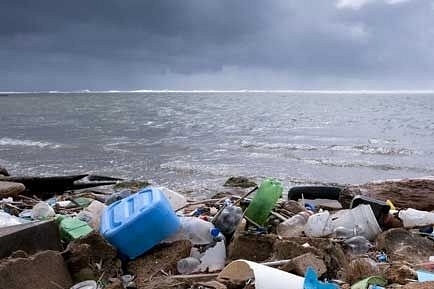
India-Germany Enter Into Agreement To Prevent Plastic Waste Entering Oceans
The project is aimed at enhancing measures to prevent plastic accumulation in oceans that is adversely affecting marine ecosystem.
India has joined hands with Germany to establish an efficient system that ensures no waste finds its way into rivers or seas.
The project, aimed at enhancing practices to prevent plastic accumulation in oceans that is adversely affecting marine ecosystems, will be undertaken at the national level, select states (Uttar Pradesh, Kerala and Andaman Nicobar Islands) and in the cities of Kanpur, Kochi and Port Blair for a period of three and a half years.
The Ministry of Housing and Urban Affairs and Deutsche Gesellschaft für Internationale Zusammenarbeit (GIZ) GmbH India on behalf of the German Federal Ministry of Environment, Nature Conservation and Nuclear Safety signed an agreement on technical cooperation titled, ‘Cities Combating Plastic Entering the Marine Environment’ at a virtual ceremony.
Marine litter threatens ecosystems and adversely affects fishery and tourism industries around the globe. In addition to negative economic impact, it affects public health with increased concerns about micro-plastic and risk of particles entering the food chain.
This project is envisaged under the contours of the joint declaration of intent regarding cooperation in the field of ‘Prevention of Marine Litter’ signed between Republic of India and Federal Republic of Germany in 2019.
Speaking at the signing ceremony, Housing and Urban Affairs Secretary Durga Shanker Mishra said, "2021 marks 63 years of fruitful development cooperation between our two countries. It gives me great pleasure to kickstart this new endeavour with our German partner. The project’s outcomes are completely in line with the objectives of Swachh Bharat Mission-Urban focusing on sustainable solid waste management and Prime Minister’s vision to phase out single use plastic by 2022."
It is estimated that 15-20 per cent of all plastics are entering oceans via riverine ecosystems of which 90 per cent are contributed by 10 of the world’s most-polluting rivers. Two of these river systems are located in India — Ganga and Brahmaputra.
This project will support the Swachh Bharat Mission-Urban’s implementation with special focus on preventing plastic litter entering the rivers and water bodies at source.
To this end, cities will be enabled to improve collection, segregation and marketing of plastic waste, to prevent plastic disposal to water bodies, and to improve handling of port and marine waste.
This will be combined with data management and reporting systems, civil society involvement and increased cooperation with recyclers and the recycling industry through a digital platform.